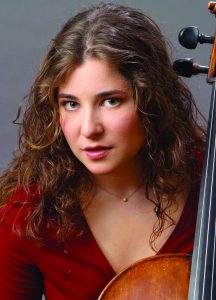Weilerstein and Barnatan in Rhapsodic Duo Recital
The duo set the bar exceedingly high with their opening account of Claude Debussy’s seldom played Sonata in D Minor for Cello and Piano. Completed during the final year of World War I and the composer’s own life, this Sonata has little in common with those pretty Arabesques and Impressionist nature scenes that define Debussy to the mind of the general public. Weilerstein and Barnatan emphasized the compact work’s constant juxtaposition of moods and textures, underscoring sharp dissonances and unexpected rhythms. They gave us the insurgent Debussy that might have contributed to the Expressionist musical culture of post-War Vienna had he not succumbed to cancer.
Following the Debussy with Franz Schubert’s C Major Fantasy, D. 934, allowed the performers to flaunt their individual technical prowess. Originally written for violin and piano, violinists have not had much use for this wandering, i.e. structurally episodic, Fantasy, and the transcription for cello and piano struck me as one of those gnarly test pieces written for competitions: formidable but not memorable. Weilerstein dashed off the ecstatic flourishes and torturous figurations with calm precision, never sacrificing her sumptuous sonority in every range of the instrument. Barnatan conquered parallel challenges, judiciously tempering the volume of the concert grand to balance the cello. He knows how to partner sensitively without becoming obsequious, and the comfort of their collaboration gave the music a palpable sense of freedom.
Although Dmitri Shostakovich wrote a substantial Cello Sonata in D Minor, evidently the duo thought another minor mode sonata on the program would have been too much of a good thing. For a dose of Shostakovich, they turned to a set of arrangements for cello and piano from his Piano Preludes, Op. 34, crafted by the contemporary Russian composer Lera Auerbach. Sauntering through this collection of miniatures, the performers gave us wistful, ironic melodies, the occasional mystical reverie, and mildly satiric swipes at ingratiating salon music.[php snippet=1]
Offering a generous portion of late-Romantic effusion so beloved by the La Jolla Music Society patrons, the program climaxed with Sergei Rachmaninoff’s Sonata in G Minor for Piano and Cello. Written in 1901 the wake of his well-received Second Piano Concerto (the one the San Diego Symphony and Lang Lang took to Carnegie Hall last fall), this Sonata in G Minor communicates orchestral scale passions in the architecture of elegantly structured chamber music. Barnatan’s lighter touch and immaculate phrasing served this music better than the usual muscular pianism favored by most Russian pianists. He made us sense the volatile emotional urgency in the music rather than overpowering us with it.
Always the consummate melodist, Rachmaninoff was profligate with heart-wrenching themes, and Weilerstein interpreted these with an intensity any opera diva could justifiably covet. The sensuous Andante unleashed an emotional catharsis equal to the final act of any Puccini opera.
La Jolla Music Society Program 17 Jan 2014

Ken Herman, a classically trained pianist and organist, has covered music for the San Diego Union, the Los Angeles Times’ San Diego Edition, and for sandiego.com. He has won numerous awards, including first place for Live Performance and Opera Reviews in the 2017, the 2018, and the 2019 Excellence in Journalism Awards competition held by the San Diego Press Club. A Chicago native, he came to San Diego to pursue a graduate degree and stayed.Read more…



